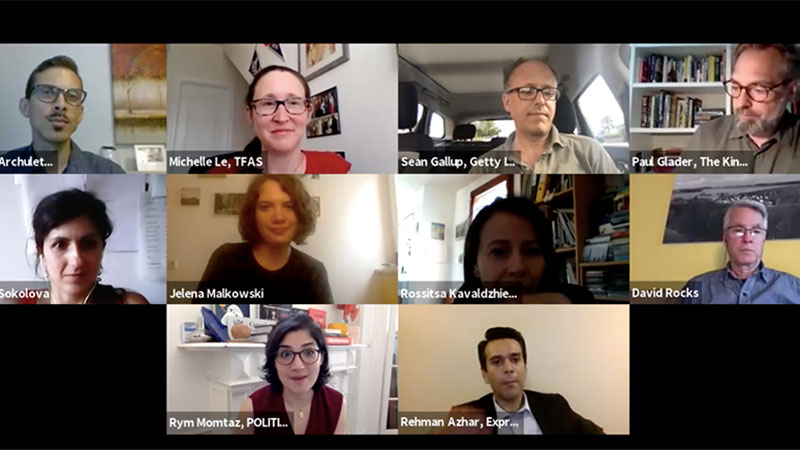
Despite closures by partner universities abroad and travel restrictions imposed by the ongoing coronavirus pandemic, the 2020 European Journalism Institute (EJI) welcomed 22 participants from 13 countries in July for a three day virtual seminar on “Journalism, Liberty and COVID-19.”
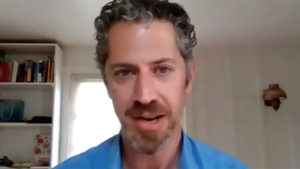
Sponsored by TFAS and The Media Project, this three-part virtual conference gave journalists the opportunity to share experiences and lessons learned during the coronavirus outbreak, and how this moment in time will mold the industry going forward.
The first session began with a discussion on “History, Journalism and Pandemics” led by TFAS professor Ibrahim Al-Marashi ’01. Marashi spoke on how journalists have covered past pandemics, and how scientists and physicians have contributed to the media to encourage informed conversations about health security.
The following day, TFAS alumni and faculty journalists from across the globe met virtually for session two of the conference. This seminar’s discussion focused on “How We’re Covering the Story–Not Just Our Faces,” exploring how various media outlets are covering news of the coronavirus pandemic in different parts of the world.
The Challenges of COVID-19
TFAS photojournalism professor Sean Gallup shared what covering the coronavirus pandemic was like in Berlin, showing photos that he and his colleagues captured of empty grocery store shelves, long lines at testing centers, and empty parks and town squares. As chief news photographer in Germany for Getty Images, Gallup said the coronavirus outbreak dramatically changed not only the news they covered, but also the way they covered it.
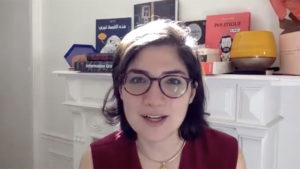
“It really turned upside down the way we work,” Gallup said. “The whole regular structure of events or press conferences that we would normally cover was all out the window, and everything that we covered we really had to fight for in terms of figuring out what’s happening, where, and how to get access to it.”
France correspondent for Politico Europe, Rym Momtaz ’05, ’07 agreed that her day-to-day work was transformed by the coronavirus pandemic. As a political reporter, Momtaz shared the challenges she faced in covering timely news without the ability to conduct in-person interviews and event coverage.
“It brought to light some very real challenges that we take for granted as journalists because, in normal times, you could just call someone up and get them to meet with you in person–whether it was for coffee or lunch,” Momtaz explained. “But when we don’t have that, it really restricts our ability to do our work, which is to inform our readers and our citizens in general. Democracy suffers when we can’t do that.”
Finding A New Angle
Another challenge journalists face today is determining how to deliver timely news coverage with a unique angle. Professor Paul Glader ’99, ’00, emphasized the importance of recognizing “news fatigue” as a journalist, and searching for ways to create different angles when reporting.
As executive editor of Religion Unplugged, an online magazine by The Media Project, Glader discussed how he and his colleagues have worked to share stories that depict religion as a source of hope, meaning and peace at a time when most news focuses on conflict and negativity.
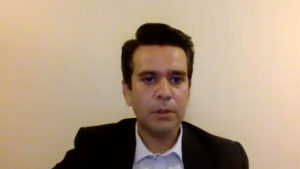
“We’re part of the slow journalism movement,” Glader said. “We’re not trying to flood the internet with copy. We’re trying to use our network around the world to find angles and stories that maybe others aren’t finding.”
TFAS professor David Rocks reinforced the importance of finding new angles when reporting on COVID-19 in relation to data collection. As editor-at-large for Bloomberg News in Berlin, Rocks shared how performing data research can often inspire ideas for stories that he and his colleagues otherwise would not have considered.
“Bloomberg was founded as a data company and only later got into journalism, so that means that we have access to a ton of data,” Rocks said. “We pride ourselves on using it to spark story ideas.”
Participant Rehman Azar ’10 said that he was most interested to hear how each of the panelists have covered similar stories in such different ways. A program host for Express News in Pakistan, Azar said the seminar helped him to understand journalism in a global context.
“We all have a different set of priorities and issues during our coverage,” Azar said. “As a journalist, it was interesting to know how one story has so many different faces.”
Navigating The Media Landscape
Glader also joined participants for the final day of the three-day conference, alongside White House correspondent for Just The News, Carrie Sheffield ‘06, Novak ‘06, and BBC correspondent in the Czech Republic and Slovakia, Rob Cameron. The third session included a conversation on “Navigating the Media Landscape: Career Strategies Post-COVID.”
Glader discussed the effect of COVID-19 on the news cycle and cited media trends in the U.S. including a shift from advertising revenue to a subscription-based model, partisan political pressure, the growth of podcasting and the influence of “Big Tech” funding.
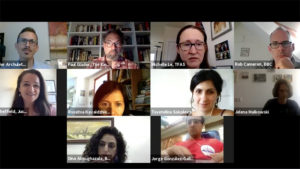
Following Glader’s remarks, Sheffield and Cameron led a discussion on how to navigate a career in journalism, sharing their experiences in the industry. A participant of EJI in 2006 and a Robert Novak Journalism Fellow that same year, Sheffield worked as a journalist for Politico, The Hill, and several other media companies before joining Just The News. Cameron also shared interesting insights about the challenges of being a long-term freelance journalist as the media landscape continues to evolve.
Though EJI could not be held in-person in Prague this year, participants still had the opportunity to form connections with world-class journalism professionals and explore vital issues in the field today through small group discussion sessions. Senior researcher at Fundación Civisimo, Jorge González-Gallarza, believes that the valuable insights he heard during the seminar have equipped him for a future career in journalism.
“I was particularly impressed with the ability of the TFAS International team to smoothly transform a generic conference into one specifically geared to address COVID-19’s challenges to the industry,” González-Gallarza said. “I came away from the virtual seminar with an invaluable network of like-minded aspiring and leading writers who will no doubt remain a repository of advice as I endeavor to pursue my own career in the field.”
This year marks four years since relaunching the European Journalism Institute, which first ran from 2004 to 2011. To learn more about the program, please visit TFAS.org/EJI.

